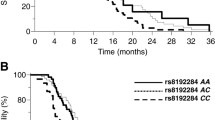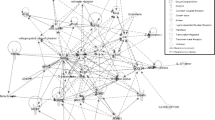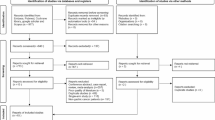Abstract
Objective
The cancer anorexia/weight loss syndrome commonly occurs in patients with non-small cell lung cancer (NSCLC) and is characterized by loss of weight and appetite as well as diminished survival. The current study explored whether any of 22 single nucleotide polymorphisms (SNPs) of certain previously implicated inflammatory cytokines (interleukin-1 beta, interleukin-1RN, interleukin-6, and tumor necrosis factor) are associated with this syndrome.
Patients and Methods
All NSCLC patients who had been enrolled in the Mayo Clinic Lung Cancer Cohort, had completed a health-related questionnaire approximately 6 months after enrollment, and had blood drawn were included in this study, thus yielding a sample size of 471 patients.
Results
Sixty-six (14%) patients manifested weight loss shortly after diagnosis, and 152 (32%) reported appetite loss. Only tumor necrosis factor alpha rs800629 was associated with anorexia (odds ratio: 0.46; 95% confidence interval: 0.29, 0.72; p < 0.001); patients who were heterozygous and minor homozygous were less likely to suffer anorexia. Otherwise, there were no statistically significant associations between any of the other 21 SNPs and weight loss and/or anorexia. In univariate analyses, weight loss, anorexia, more advanced cancer stage, and interleukin-1 beta rs1143627 were associated with a worse survival, and interleukin-6 rs2069835 was associated with better survival. However, in multivariate analyses, cancer stage and patient age were the only statistically significant predictors of worse survival.
Conclusion
No specific SNP was associated with all aspects of the cancer anorexia/weight loss syndrome, but rs800629 may merit further study in cancer-associated anorexia.
Similar content being viewed by others
References
Jeremic B, Milicic B, Dagovic A, Acimovic L, Milisavljevic S (2006) Pretreatment prognostic factors in patients with early stage (I/II) non-small-cell lung cancer treated with hyperfractionated radiation therapy alone. Int J Radiat Oncol Biol Phys 65(4):1112–1119
Dewys WD, Begg C, Lavin PT, Band PR, Bennett JM, Bertino JR, Cohen MH, Douglass HO Jr, Engstrom PF, Ezdinli EZ, Horton J, Johnson GJ, Moertel CG, Oken MM, Perlia C, Rosenbaum C, Silverstein MN, Skeel RT, Sponzo RW, Tormey DC (1980) Prognostic effect of weight loss prior to chemotherapy in cancer patients. Eastern Cooperative Oncology Group. Am J Med 69(4):491–497
Chuang RB, Hu WY, Chiu TY, Chen CY (2004) Prediction of survival in terminal cancer patients in Taiwan: constructing a prognostic scale. J Pain Symptom Manage 28(2):115–122
Loprinzi CL, Laurie JA, Wieand HS et al (1994) Prospective evaluation of prognostic variables from patient-completed questionnaires. J Clin Oncol 12:601–7
Seruga B, Zhang H, Bernstein LJ, Tannock IF (2008) Cytokines and their relationship to the symptoms and outcome of cancer. Nat Rev Cancer 8(11):887–899
Grim-Stieger M, Keilani M, Mader RM, Marosi C, Schmidinger M, Zielinski CC, Fialka-Moser V, Crevenna R (2008) Serum levels of tumour necrosis factor-alpha and interleukin-6 and their correlation with body mass index, weight loss, appetite and survival rate—preliminary data of Viennese outpatients with metastatic cancer during palliative chemotherapy. Eur J Cancer Care 17(5):454–462
Bennani-Baiti N, Davis MP (2008) Cytokines and cancer anorexia cachexia syndrome. Am J Hosp Palliat Care 25(5):407–411
Zhang D, Zhou Y, Wu L, Wang S, Zheng H, Yu B, Li J (2008) Association of IL-6 gene polymorphisms with cachexia susceptibility and survival time of patients with pancreatic cancer. Ann Clin Lab Sci 38(2):113–119
Tan BH, Deans DA, Skipworth RJ, Ross JA, Fearon KC (2008) Biomarkers for cancer cachexia: is there also a genetic component to cachexia? Support Care Cancer 16(3):229–234
Zhang D, Zheng H, Zhou Y, Tang X, Yu B, Li J (2007) Association of IL-1beta gene polymorphism with cachexia from locally advanced gastric cancer. BMC Cancer 7:45
Rami-Porta R, Crowley JJ, Goldstraw P (2009) The revised TNM stating system for lung cancer. Ann Thorac Cardiovasc Surg 15(1):4–9
Bozetti F, Gavazzi C, Micelli R et al (2000) Perioperative total parenteral nutrition in malnourished, gastrointestinal patients. JPEN 24(1):7–14
Loprinzi CL, Ellison NM, Schaid DJ, Krook JE, Athmann LM, Dose AM, Mailliard JA, Johnson PS, Ebbert LP, Geeraerts LH (1990) Controlled trial of megestrol acetate for the treatment of cancer anorexia and cachexia. J Natl Cancer Inst 82(13):1127–1132
Jatoi A, Egner J, Loprinzi CL et al (2004) Investigating the utility of serum cytokine measurements in a multi-institutional cancer anorexia/weight loss trial. Support Care Cancer 12(9):640–4
Dhiman N, Poland GA, Cunningham JM et al (2007) Variations in measles vaccine-specific humoral immunity by polymorphisms in SLAM and CD46 measles virus receptors. J Allerg Clin Immunol 120:666–672
Roledo R, Beggs W, Bender P (2003) A simple and effective method for rapid genotyping of insertion/deletion polymorphisms. Genomics 82:580–582
Schmidt C (2007) SNPS not living up to promise; experts suggest new approach to disease ID. J National Cancer Institute 99(3):189–9
Author information
Authors and Affiliations
Corresponding author
Additional information
This project was funded by R01 CA115857 and R01 84354 to Dr. Yang and by K24CA131099 to Dr. Jatoi.
Rights and permissions
About this article
Cite this article
Jatoi, A., Qi, Y., Kendall, G. et al. The cancer anorexia/weight loss syndrome: exploring associations with single nucleotide polymorphisms (SNPs) of inflammatory cytokines in patients with non-small cell lung cancer. Support Care Cancer 18, 1299–1304 (2010). https://doi.org/10.1007/s00520-009-0748-6
Received:
Accepted:
Published:
Issue Date:
DOI: https://doi.org/10.1007/s00520-009-0748-6




